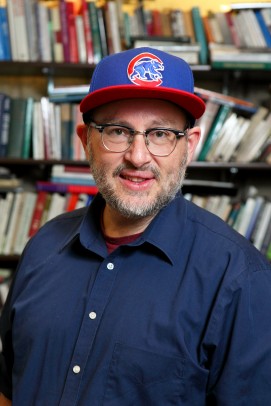Historian prepares students to lead own classrooms
Each year, UIC honors some of its most dedicated and outstanding teachers with the Award for Excellence in Teaching. The winners, who receive a $5,000 salary increase, are selected by past recipients of the award from nominations made by departments and colleges.
Robert Johnston is UIC’s leading expert on the teaching of history and his influence goes well beyond campus classrooms.
As director of UIC’s Teaching of History program, he plays a key role in preparing master’s and bachelor’s students to lead their own classrooms, as well as in the professional development of current educators.
He has served as the academic director for three U.S. Department of Education Teaching American History grants, each more than $1 million, in conjunction with the Newberry Library and the Chicago Metro History Education Center. He teaches and directs a four-week National Endowment for the Humanities summer institute for K-12 teachers from across the country.
Johnston, whose research focuses on the Gilded Age and Progressive Era, post-1970 U.S. history, the history of medicine, and the politics of historiography, doesn’t come from a traditional education background. As a result, he was a bit unsure of the position when he arrived from Yale in 2003.
“I recognized that the focus within my own scholarship was very much on democracy — especially during the Progressive Era, but throughout American history,” he said. “I ultimately realized how important and worthwhile it was, then, to also cultivate democracy and help it flourish in my daily life as a professor, especially in the classroom.”
Johnston’s own teaching practice is heavily influenced by his undergraduate studies at Reed College, a small liberal arts college where intellectual discussion was at the center of every course.
“I thought that it was truly empowering and made students genuinely accountable,” he explained.
He feels strongly that the classroom itself is a democratic space, so he aims to foster a respectful environment for critical discussion and debate.
“I really want to decenter the authoritative textbook. In fact, most of my classes get rid of it and focus on high level scholarship, secondary sources that are contentious,” he said.
“Robust classroom discussion is a wonderful and unfortunately very rare opportunity to really dig in and get to know each other and get to cross ideological boundaries and not just argue, not just hold your position, but in fact say, ‘Hold on a second, maybe I’m going to learn from that other position and that other side.’”
“What it really provides, especially in a public school like UIC, is a great proving ground for people to go on and practice democracy later in life.”
Johnston is a two-time recipient of both the UIC Council for Excellence in Teaching and Learning’s Teaching Recognition Program Award, and the department of history’s Shirley Bill Award for excellence in teaching, which is based on votes from undergraduate and graduate students.
“He is one of those model professors who truly open their students’ minds and provide the kind of rich learning experience that makes a liberal education so life-changing,” wrote Astrida Orle Tantillo, dean of the College of Liberal Arts and Sciences, in support of Johnston’s nomination for the UIC Award for Excellence in Teaching.

